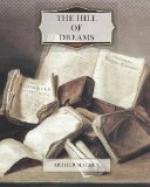He lit a candle and held it close up to the glass so that his own face glared white at him, and the reflection of the room became an indistinct darkness. He saw nothing but the candle flame and his own shining eyes, and surely they were not as the eyes of common men. As he put down the light, a sudden suggestion entered his mind, and he drew a quick breath, amazed at the thought. He hardly knew whether to rejoice or to shudder. For the thought he conceived was this: that he had mistaken all the circumstances of the adventure, and had perhaps repulsed a sister who would have welcomed him to the Sabbath.
He lay awake all night, turning from one dreary and frightful thought to the other, scarcely dozing for a few hours when the dawn came. He tried for a moment to argue with himself when he got up; knowing that his true life was locked up in the bureau, he made a desperate attempt to drive the phantoms and hideous shapes from his mind. He was assured that his salvation was in the work, and he drew the key from his pocket, and made as if he would have opened the desk. But the nausea, the remembrances of repeated and utter failure, were too powerful. For many days he hung about the Manor Lane, half dreading, half desiring another meeting, and he swore he would not again mistake the cry of rapture, nor repulse the arms extended in a frenzy of delight. In those days he dreamed of some dark place where they might celebrate and make the marriage of the Sabbath, with such rites as he had dared to imagine.
It was perhaps only the shock of a letter from his father that rescued him from these evident approaches to madness. Mr. Taylor wrote how they had missed him at Christmas, how the farmers had inquired after him, of the homely familiar things that recalled his boyhood, his mother’s voice, the friendly fireside, and the good old fashions that had nurtured him. He remembered that he had once been a boy, loving the cake and puddings and the radiant holly, and all the seventeenth-century mirth that lingered on in the ancient farmhouses. And there came to him the more holy memory of Mass on Christmas morning. How sweet the dark and frosty earth had smelt as he walked beside his mother down the winding lane, and from the stile near the church they had seen the world glimmering to the dawn, and the wandering lanthorns advancing across the fields. Then he had come into the church and seen it shining with candles and holly, and his father in pure vestments of white linen sang the longing music of the liturgy at the altar, and the people answered him, till the sun rose with the grave notes of the Paternoster, and a red beam stole through the chancel window.
The worst horror left him as he recalled the memory of these dear and holy things. He cast away the frightful fancy that the scream he had heard was a shriek of joy, that the arms, rigidly jerked out, invited him to an embrace. Indeed, the thought that he had longed for such an obscene illusion, that he had gloated over the recollection of that stark mouth, filled him with disgust. He resolved that his senses were deceived, that he had neither seen nor heard, but had for a moment externalized his own slumbering and morbid dreams. It was perhaps necessary that he should be wretched, that his efforts should be discouraged, but he would not yield utterly to madness.




